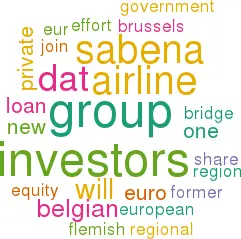Belgian exertions to resurrect flag-carrier
January 2002


On December 21, the investors group SN Air Holding led by Belgian luminaries Etienne Davignon and Maurice Lippens acquired all the shares of DAT, the former Sabena regional subsidiary, from the bankruptcy administrators for one "symbolic" Euro. The airline will be headed by Dutchman Rob Kuijpers, 63, former CEO of DHL Worldwide Express.
The investors group has pledged to invest Euro 200m in the "new Sabena" under two conditions:
- SIC (the former Sabena financial coordination centre) must renounce its EUR 111 million claim on DAT; and
- Leasing contracts for 28 aircraft (out of a fleet of 32) must be revised 40% down on current levels.
The investors group will walk away from the airline if both conditions are not met by mid- January.
The creation of the so–called "private" investors group has not been smooth sailing and tensions still exist within the group itself. Banks that are creditors of Sabena and which have been asked to transform their claims into equity in the new airline are not pleased.
Curiously, the investors group will not reveal the names of its members. It is up "to them to say whether they have joined or not." The Flemish Region, for one, has steadfastly refused to inject its proposed share of EUR 24.7 million. The Flemish Region is however willing to put money into Brussels International Airport Company BIAC), the state–owned airport operator. BIAC, which is to be privatised, is not so keen on the offer.
The Virgin Group (not Virgin Express, which could not afford it) has replaced the reluctant Flemish Region in the investors group, and has reported injected Euro 25m. Virgin’s position is complicated by the fact that it is a partner to DAT on some routes and in direct competition with the airline on others. Talks to reduce "overcapacity" on the latter are currently taking place.
Meanwhile, time is running out fast for DAT.
The airline has used up all of the Euro 124m bridge loan received from the Belgian state in early November (the loan was originally destined for Sabena but the European Commission agreed that it could be transferred to DAT). The airline is now kept alive by short–term bank loans, which may be transformed into equity at a later stage. The pledge made by Belgium to repay the bridge loan within six months — a condition imposed by the European Commission — appears to have become academic.
Linguistics
At the best of times, Belgian politics are complicated by the linguistic divide between North and South, and the sharing of power between powerful trade unions and the political parties that is enshrined in the system. Adding insult to injury, the collapse of the national carrier took place during the Belgian presidency of the European Union, causing huge embarrassment to the ruling coalition of Liberals, Socialists and Greens.
It was therefore inevitable that no effort would be spared by the federal government to ensure that Sabena would be resurrected in one form or another — or at least to be perceived to make such an effort.
Regional subsidiary DAT was spared the fate of its parent Sabena and allowed to operate under court protection. DAT, having no real equity of its own, was then given the bridge loan originally intended for Sabena. At the same time, the government assembled a posse of business leaders whose tasks were to corral investors from the private sector. Recognising the challenge of seeking private investment in a failing airline at the worst of times, and unable to intervene itself under EC regulations, the federal government also attempted to convince the three regional governments (Flanders, Brussels and Wallonia) to join the investors group. Brussels and Wallonia, normally more inclined to favour state intervention in the economy than Flanders, agreed.
But the private sector needed more convincing arguments. Discreet but firm entreaties were made to the leading companies in Belgium. Thebanks, of course, because they were already involved as creditors of Sabena, but perhaps more surprisingly a range of industrialists engaged in the chemical, brewing and retail sectors, as well as utilities, were contacted by teams set up by Davignon and Lippens.
Public calls for patriotism (we need a national airline) were quietly supported by generous tax inducements. It has been reported that investors in the new airline will be allowed to fiscally deduct their entire investment in one year.
State–owned air traffic control provider Belgocontrol was also asked to join the investors group. The state–appointed board of directors first declined the offer, then was persuaded to join, and finally decided against it on legal grounds.
Another state–controlled institution, the insurance company SMAP, has refused to contribute a share of EUR 8m. Conversely, family–controlled Solvay chemical group has pledged its share, despite objections raised by US institutional investors.
This enormous collective effort will come to naught if leasing companies do not cooperate, or if EU law is found to have been breached. But even if it is relaunched under a new name, according to the current plan, DAT will face angry competitors on all of its major routes.